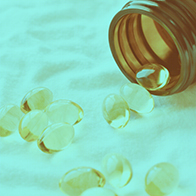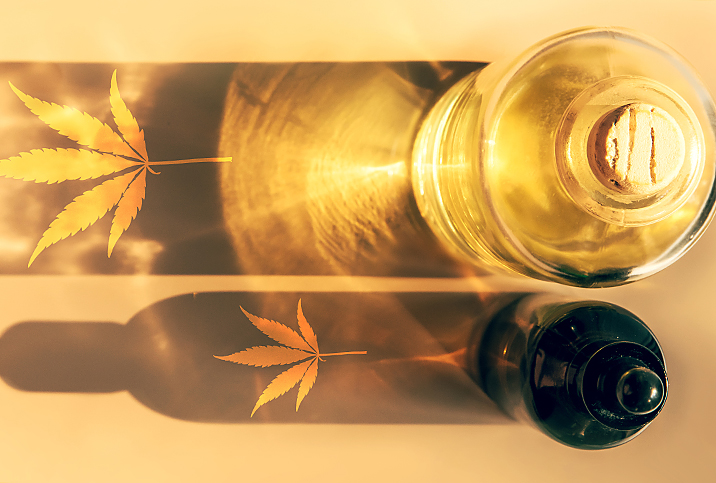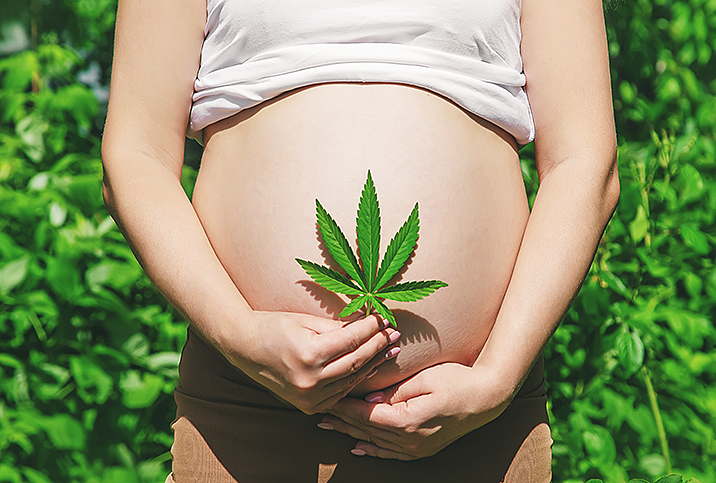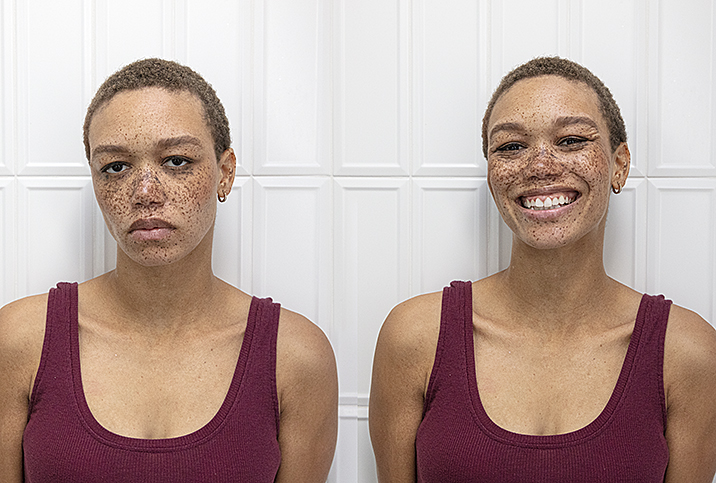Can CBD Relieve Period Pain?
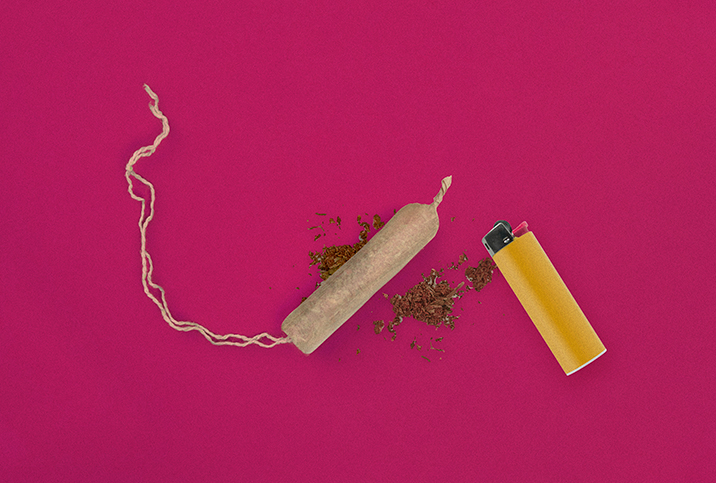
For the average person with a period, cramps indicate the body's doing what it's designed to do. But that doesn't make it any less painful. PMS can cause headaches, irritability, fatigue, an insatiable appetite, mood swings and, of course, cramping. The pain can be even more severe and debilitating for those with a gynecological disorder, such as endometriosis or a hormonal imbalance.
If you're one of the 84 percent of people who experience menstrual pain, you may have heard of CBD as a potential option for respite. A cousin to marijuana, this plant-based medicinal has been popping up everywhere over the past few years, extolled as a possible solution for everything from epilepsy to anxiety to arthritis. CBD is legal in most states, but check your local laws for specifics.
While CBD is often hailed as a miracle drug—can it work for period pain? Here's what the experts have to say.
What causes period pain?
The uterus, fueled by increased estrogen, prepares for a potential pregnancy by building up endometrial tissue in the weeks before a period. Once you've ovulated, a boost of progesterone signals the body to fill the tissue with blood, laying out the red carpet for an embryo. When there's no guest to host, the body must shed that lining (menstruation).
"Period pain is influenced by a hormone called prostaglandin, which is responsible for making your uterus contract. Women with higher levels of prostaglandin tend to have more severe period cramps," said Heather Hanks, M.S., CAM, medical advisor at Medical Solutions Barcelona.
Hanks added that being overweight or having a high BMI (body mass index) can increase pain and duration. Other factors—including stress, genetics, inflammation, lack of sleep or exercise, lifestyle habits such as smoking, and excessive consumption of alcohol, caffeine or processed foods—can contribute, too.
Of course, conditions like endometriosis or uterine fibroids can exponentially increase pain.
How does CBD work?
CBD is a cannabinoid found in the cannabis plant. Most CBD is extracted from cannabis sativa (hemp) instead of cannabis indica (marijuana) because hemp contains a high concentration of CBD and relatively little THC (the psychoactive compound in weed that gets you "high"). Because hemp extracts naturally contain all available cannabinoids in the cannabis plant, CBD products can have up to 0.3 percent THC. To be clear, that isn't nearly enough to get anyone high.
The body contains multitudes of endocannabinoids, receptors and enzymes in a vast network called the endocannabinoid system (ECS). The ECS is responsible for modulating a broad array of functions and processes, including pain sensation, appetite, sleep and inflammation. CBD and its fellow cannabinoids mimic the body's endocannabinoids and bind to receptors, activating them and improving ECS function.
"CBD helps with homeostasis. We have receptors all over our bodies and a large load in the female reproductive tract. CBD provides pain relief without psychoactivity," said Lynn Parodneck, M.D., medical marijuana advisor at TribeTokes. "It also serves as an anti-inflammatory agent. So, CBD helps the body stay on track."
Is CBD effective for menstrual pain?
There is no published research to date detailing exactly how CBD affects period pain. However, there is ample evidence of CBD's efficacy in relieving other types of pain. Experts posit it may assuage dysmenorrhea (menstrual pain) by reducing inflammation when the uterus contracts to discard endometrial tissue.
"Research shows that CBD may also inhibit an enzyme needed to make prostaglandin, which may help reduce period cramps and uterus contractions," said Hanks.
"The endocannabinoid system and its response to cannabis widely vary from person to person," Hanks continued. "Some women may find that CBD is very useful for alleviating period pain, while others find that it doesn't do much at all. The best thing you can do is try it out and see if it works for you."
'CBD has excellent calming, anti-anxiety, anti-stress and anti-inflammatory properties.'
For some people, topical CBD treatments can assuage pain immediately, while tinctures, oils, gummies and other oral methods typically take a bit longer, from 30 minutes to an hour. It's also important to keep in mind you may have to take CBD for a few days or weeks to reap the full benefits.
"This can be frustrating if you are used to taking over-the-counter pain relievers that work almost instantly," said Hanks. "However, unlike NSAIDs, such as Ibuprofen, CBD is much gentler on the stomach and does not appear to cause stomach ulcers. So, CBD can be a good alternative to over-the-counter medications if you are looking for something more natural."
CBD may also make that time of the month more bearable by relieving menses-related ailments, including headaches, nausea, anxiety and depression. It can help regulate appetite, as well.
"CBD has excellent calming, anti-anxiety, anti-stress and anti-inflammatory properties. Many people take it to help with mood problems, racing thoughts, and insomnia, which are prevalent for many women during menstruation," said Hanks.
Is CBD safe?
Whether you're wary of cannabis specifically or suspicious of trendy health supplements as a whole (understandable), experts assure us CBD is usually safe.
"CBD has a strong safety profile. Too much makes you sleepy and gives you a bit of GI distress," said Parodneck. "However, the pain relief can be adequate with no serious side effects or overdose potential. There is no psychoactivity associated with CBD, so women can work, drive, and do what they need to do."
However, it is vital to buy lab-tested products from a reputable supplier (i.e., not a bodega or a friend of a friend) and take as recommended. Additionally, talk to your doctor about how CBD interacts with your other medications to ensure it's safe.
"Consumers need to make sure the CBD is authentic and work with dosing. It is important to understand that CBD is metabolized in the liver and can interfere with the metabolism of certain other medications," said Parodneck. "Thus, users should work with a clinician prior to using CBD."
What CBD products are best for me?
There is a vast array of CBD products on the market, from bath bombs to chocolates and vape liquids to suppositories. For the most part, product quality is more important than packaging.
"There are several ways you can take CBD. Tincture and oil forms are popular because they are very versatile. You can take them as is or add them to smoothies, baked goods, etc. Oils and tinctures tend to be better absorbed because they bypass most of the digestive process and are more readily absorbed into the bloodstream," said Hanks.
'The best thing you can do is try it out and see if it works for you.'
She added that CBD suppositories (either anal or vaginal) can be beneficial for lower body pain such as menstrual cramps. Suppositories do take up to 20 minutes to fully dissolve, so be sure to wait before inserting a tampon.
"I suggest that patients try different methods and combinations—this is the best way to determine what works for each individual," said Parodneck. "Of course, doses and responses vary greatly. So, the only way to figure it out is by trying."








